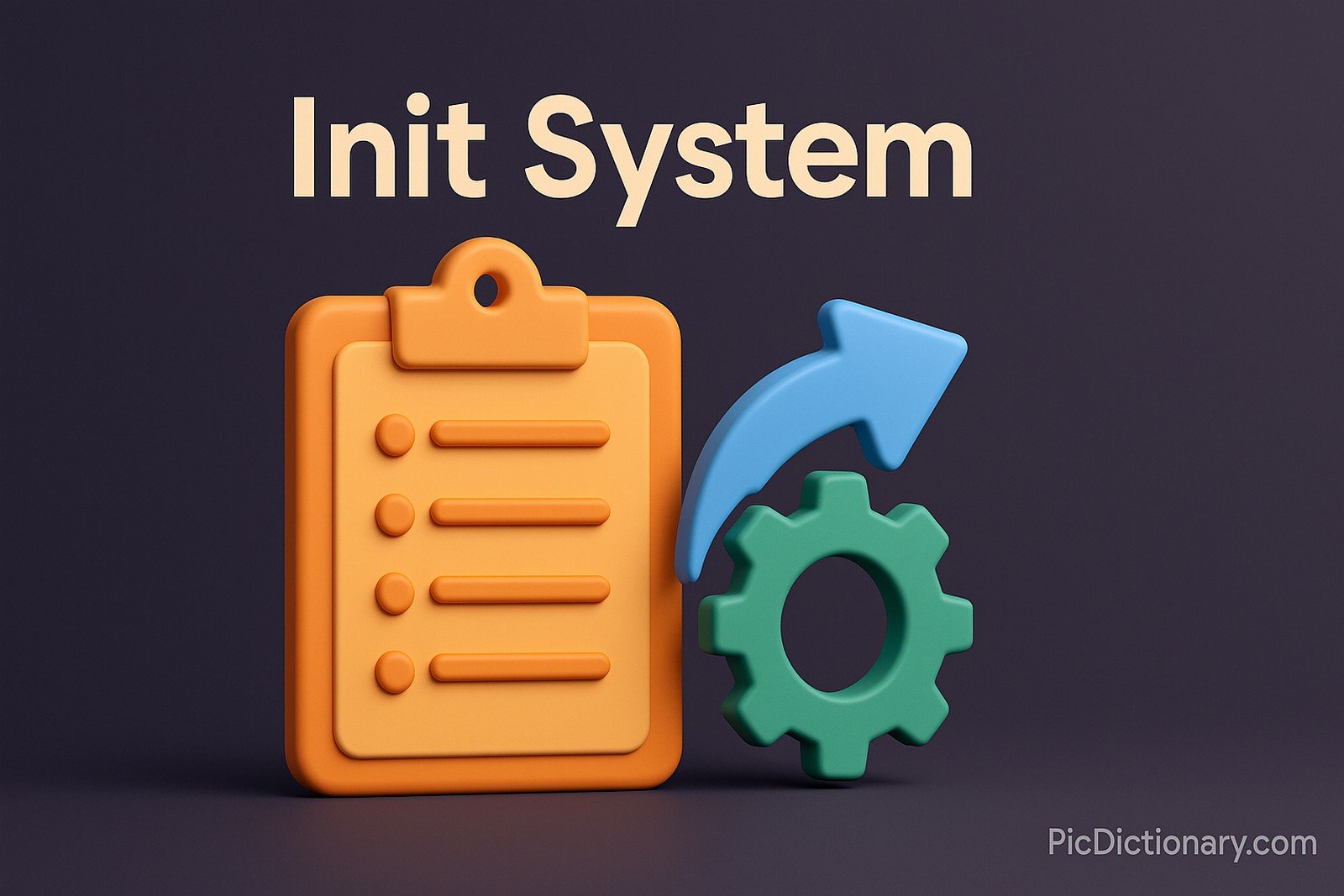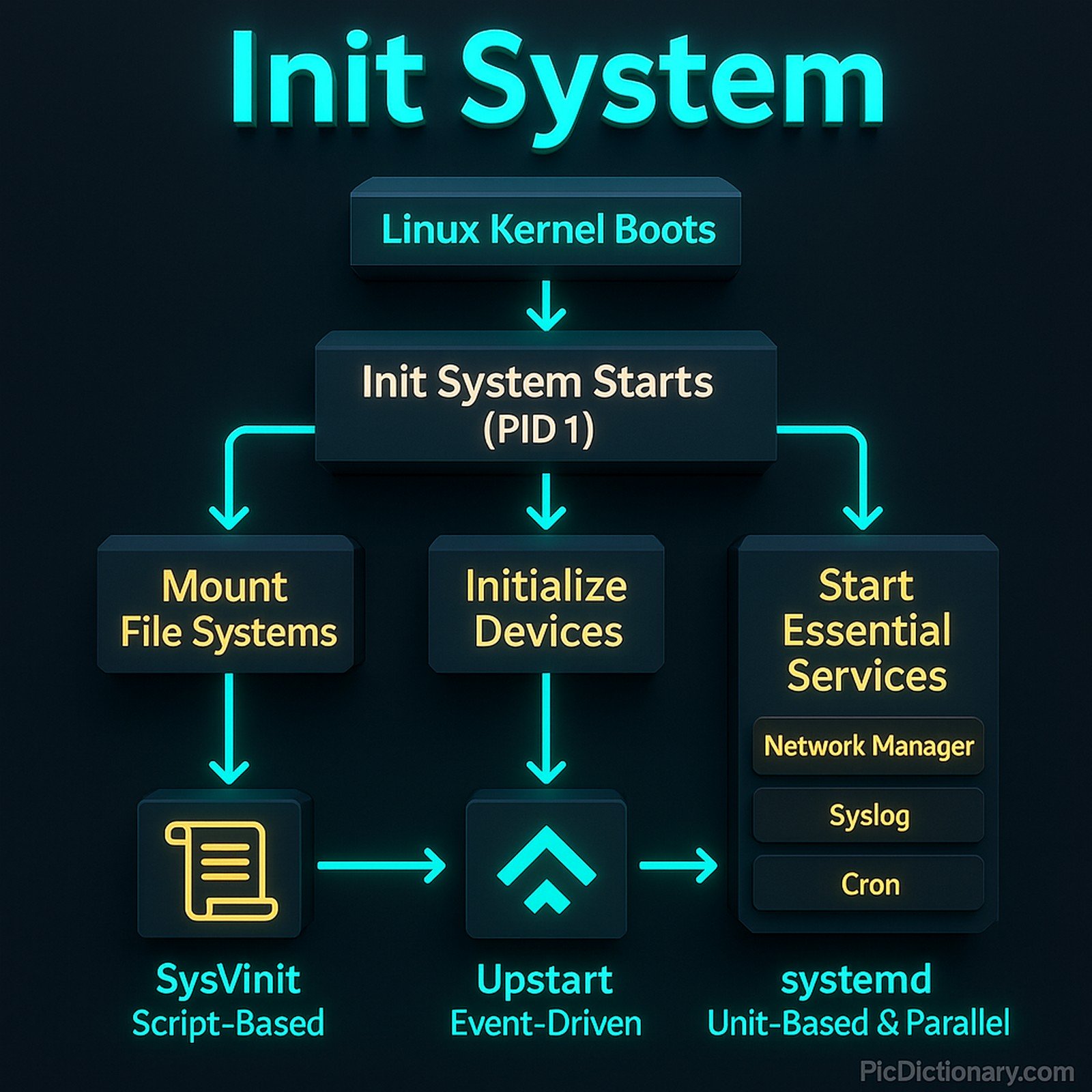Init System (SysV, Upstart, systemd)

Quick Navigation:
- Init System (SysV, Upstart, systemd) Definition
- Init System (SysV, Upstart, systemd) Explained Easy
- Init System (SysV, Upstart, systemd) Origin
- Init System (SysV, Upstart, systemd) Etymology
- Init System (SysV, Upstart, systemd) Usage Trends
- Init System (SysV, Upstart, systemd) Usage
- Init System (SysV, Upstart, systemd) Examples in Context
- Init System (SysV, Upstart, systemd) FAQ
- Init System (SysV, Upstart, systemd) Related Words
Init System (SysV, Upstart, systemd) Definition
An init system is the first process that runs after the operating system kernel has booted. It is responsible for initializing system components, managing system processes, and facilitating smooth startup and shutdown sequences. Modern init systems like SysVinit, Upstart, and systemd handle services, mount file systems, and perform other essential system tasks. SysVinit uses traditional scripts, Upstart introduced event-based init, and systemd, the most advanced, uses units and parallel service.
Init System (SysV, Upstart, systemd) Explained Easy
Imagine turning on a computer is like starting a day. The init system is like your morning routine guide — it tells you to brush your teeth, have breakfast, and get ready. Without it, everything would be chaotic. It makes sure all the system services (like alarm clocks or coffee makers) start in the right order.
Init System (SysV, Upstart, systemd) Origin
Init systems have evolved from simple scripts in Unix systems. SysVinit became standard in the early 1980s. Upstart emerged in 2006 to address limitations in SysVinit with event-driven tasks. Systemd, introduced in 2010, further revolutionized startup processes with parallel service handling and modern features.
Init System (SysV, Upstart, systemd) Etymology
The term "init" comes from "initialize," representing the system's role in starting essential processes.
Init System (SysV, Upstart, systemd) Usage Trends
SysVinit was widely used in Unix-based systems until the mid-2000s. Upstart had a brief but notable period in Ubuntu and other distributions. Today, systemd has become dominant in most major Linux distributions due to its speed, reliability, and advanced service management capabilities.
Init System (SysV, Upstart, systemd) Usage
- Formal/Technical Tagging:
Linux, Operating Systems, Process Management - Typical Collocations:
"init system boot process," "systemd services," "SysVinit scripts," "Upstart event handling"
Init System (SysV, Upstart, systemd) Examples in Context
- Linux distributions like Debian and Ubuntu initially used SysVinit before transitioning to systemd.
- Upstart was adopted by Ubuntu for event-driven initialization before eventually migrating to systemd.
- System administrators often write systemd unit files to manage services on modern Linux servers.
Init System (SysV, Upstart, systemd) FAQ
- What is an init system?
An init system is the first process that runs after booting and manages system processes and services. - Why was systemd introduced?
Systemd was introduced to address inefficiencies in older init systems by offering parallel service startup and better control. - What are common init systems?
SysVinit, Upstart, and systemd are the most known init systems. - Is systemd used in all Linux distributions?
Most major Linux distributions use systemd, though some use alternatives like OpenRC. - What is the role of SysVinit today?
SysVinit is still used in legacy systems but has largely been replaced by systemd and other modern solutions. - What made Upstart unique?
Upstart introduced event-driven initialization, reacting dynamically to system events. - Can you replace systemd with another init system?
Yes, but it can be complex and may not be supported by all distributions. - Does macOS use systemd?
No, macOS uses its own launchd system for service management. - Are init systems responsible for shutting down as well?
Yes, they manage both startup and shutdown sequences. - Do init systems affect boot speed?
Absolutely; modern systems like systemd significantly improve boot times.

Init System (SysV, Upstart, systemd) Related Words
- Categories/Topics:
Linux, System Administration, Process Control
Did you know?
Systemd faced controversy when it replaced traditional systems due to its complexity and scope, sparking debates in the Linux community. Despite this, its widespread adoption showcases its power in managing modern operating system processes efficiently.
PicDictionary.com is an online dictionary in pictures. If you have questions or suggestions, please reach out to us on WhatsApp or Twitter.Authors | Arjun Vishnu | @ArjunAndVishnu

I am Vishnu. I like AI, Linux, Single Board Computers, and Cloud Computing. I create the web & video content, and I also write for popular websites.
My younger brother, Arjun handles image & video editing. Together, we run a YouTube Channel that's focused on reviewing gadgets and explaining technology.



Comments powered by CComment